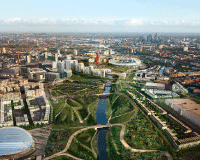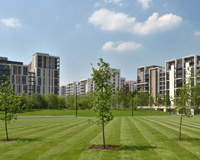 London had a great century after the completion of Regent Street in 1825; a golden age of planned improvement and growth. London was the capital of a great empire, and it received investment in buildings and infrastructure to support its growing population.
London had a great century after the completion of Regent Street in 1825; a golden age of planned improvement and growth. London was the capital of a great empire, and it received investment in buildings and infrastructure to support its growing population.
When John Nash was designing Regent Street there were already more than a million Londoners.
A century later there were more than six million. And by the second world war the population topped eight million.
London was the largest city in the world for nearly 100 years – until it was overtaken by New York in 1925.
London is like many of our great, historic global cities. They have good and bad times, periods of growth and success, but also times of challenge and retrenchment. How many of us back in the 1970s would have predicted London’s rise from a shabby capital living on past glories to the successful global capital that it is today?
London’s history is being made and remade every day, by us, its citizens.
We are lucky enough to be living through another golden age of opportunity and development.
The 2012 Olympics showed us a London that was proud enough, confident enough and united enough to create a showpiece event that was admired across the globe; and which breathed life into a part of the city that had been neglected for more than half a century.
The Olympics was about more than just hosting the largest and most spectacular sporting event on the planet.
It was also about visionary city planning – the regeneration of London’s East End.
There had been many people – perhaps even a majority of Londoners – who had wondered whether the Olympic Games could or would be a success before they began. There were none by the end.
I was in the stadium for the closing ceremony of the Paralympic Games that brought the whole wonderful summer of sport to an end. The most powerful and lasting memories for me
were how we, as a city and a country – and as a team – came together to deliver something truly exceptional.
I can tell you there was hardly a dry eye in the stadium – me included.
But the key thing about the Olympics is that they were not the end of something big. They were just the start – the start of the new golden age for London.
Of course, London is not without problems, with rising inequality and housing shortages.
What is different now is that we have the ambition and belief that London can overcome those challenges.
It is so important that London now has a focus in the mayor, his staff, and the assembly. The return of that central authority means that thinking and planning city-wide has
been restored.
And whatever your political inclinations, no-one can deny that Ken Livingstone and Boris Johnson have been national figures who have given voice to London.
And it helps that we have a great track record in this country of sensitive urban renewal, as visitors to Manchester, Leeds, Sheffield and Birmingham can attest.
This is an extract from the Honor Chapman Memorial Lecture, given by Alison Nimmo CBE, chief executive, The Crown Estate, on 23 April











